Lately I've been busy. Too busy. A kind of busy I like, the kind of busy that far eclipses the not-busy boredom I was afflicted with regularly this summer. There's something to be said about boredom.... it's kind of a zen-state of procrastination, where things that need to get done do not get done because they are not pressing, undesirable, easily hidden. Funny that in those pockets of time where I now do not have something scheduled or planned or on the to-do list, I find myself crushingly bored. Things that need to be done come off as chores.
There's a glut of new TV shows out there that I'm trying my best to weed through. "Smith" is great, "Heroes" is good if maybe leaning toward stodgy. I have yet to see "Brothers and Sisters", but its soapy allure won't keep me far from it for too long. "Studio 60 on the Sunset Strip" might be better if it didn't come off as self-important, "Six Degrees" has a concept that ran out before the pilot episode was even finished, and "The Nine" (premiering next week) is uninteresting trash masquerading as nail-biting television. I wish some shows would stop with the bravado like the writers know what they're doing when it's clear they have a vague idea about what only one or two episodes in the future will be like. Poignant that ABC has scheduled the "The Nine" with "Lost" as its lead-in, when the two shows seem to share an obsession with information-deprivation (for all parties, including the writers).
So, with TV kind of an afterthought and/or casualty of me being too busy, I've been sifting my way through literature. I just read Haruki Murakami for the first time just a week or so ago.... my inital reaction to the novel I read is that I liked it (I still do), but I think it was most successful in the mood/tone department. He seems to be so wildly popular, yet the novel I read seemed to have some questionably gaping holes in the story that make me think that this guy has been given the carte-blanche publishing card just like Joyce Carol Oates has.
But what a comfort it is to melt into perfect short stories. she can film it posted recently about how finding really good short fiction is an experience worth waiting for. Of course, I feel her pain about wading through the slush piles from hell of really bad short story submissions for publication.... it's so so rare to find something that you want to stand up and scream about, so rare in fact that when you do find it, you do stand up and scream about it (or at least I do).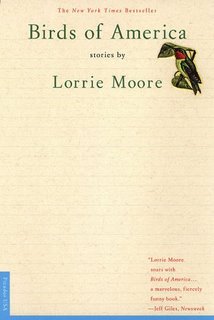 When I first heard about Lorrie Moore maybe four or five years ago, I had absolutely no idea who she was. But people gushed. They made her seem like she was the real deal. And then I sort of forgot about her.... her books weren't exactly littering bookstore shelves, nor were people always gushing about her work in my other classes. For the last year or two I've been keeping my eye out for her star-making book of short stories Birds of America and then finally found it at the Strand last month and felt like I had hit the lottery. And now I'm reading it, and it is amazing. The command of language is so clean and strong, but not minimalist or part of the minimalist craze of a lot of contemporary lit fiction. I haven't come across a story I have disliked, because everything hits true, everything rings all the right bells. Her fiction is very witty and amusing but isn't trying for laughs.... it's effortless and beautiful. It's the kind of fiction I want to bathe in, and a good road map (I think) for the kind of stuff I write. It's easy to lose myself in, it's easy to pine for.
When I first heard about Lorrie Moore maybe four or five years ago, I had absolutely no idea who she was. But people gushed. They made her seem like she was the real deal. And then I sort of forgot about her.... her books weren't exactly littering bookstore shelves, nor were people always gushing about her work in my other classes. For the last year or two I've been keeping my eye out for her star-making book of short stories Birds of America and then finally found it at the Strand last month and felt like I had hit the lottery. And now I'm reading it, and it is amazing. The command of language is so clean and strong, but not minimalist or part of the minimalist craze of a lot of contemporary lit fiction. I haven't come across a story I have disliked, because everything hits true, everything rings all the right bells. Her fiction is very witty and amusing but isn't trying for laughs.... it's effortless and beautiful. It's the kind of fiction I want to bathe in, and a good road map (I think) for the kind of stuff I write. It's easy to lose myself in, it's easy to pine for.
Lorrie Moore tends to stick exclusively with short stories (her novels seem to be less-popular), so I'm probably going to be perusing bookstore shelves for her next book. Apparently Self-Help is a book of her short stories that are all written in the second person, a point of view that I love in writing perhaps because it is so dangerous and easily prone to failure.... but when it succeeds, the second person floors everything like a devastating shock wave, it can be that good. It irritates me that everyone and their mother associates second-person narrative with Jay McInerney (thanks to his dare-I-say-one-hit-wonder Bright Lights, Big City, a book I quite enjoy), like second person belongs to him or something. Feh.
More reporting to follow. I dream that one day I'll start writing really acrid-but-devastatingly-funny blog posts like they do on Defamer, my new favorite vacuous outlet to procrastinate on while at work.
Friday, September 29, 2006
ruminations, and why good short fiction trumps all
pondered by
is that so wrong?
at
2:36 PM
4
comments
![]()
Monday, September 18, 2006
Smith: what you should be watching
Thanks to the myriad wonders of the internet, I've gotten a sneak peak and a handful of pilot episodes for new dramas forthcoming from the television networks this season. I've already narrowed my list from what seems inherently interesting to what seems any good at all, because in this day and age where every moment is precious, I don't want to waste my time watching crappy TV.
The solution: Tune in to CBS this Tuesday night and watch "Smith".
Probably the worst thing going for the show is the title. Who tunes in to something called "Smith"? I wouldn't. In a typically unsurprising move on the parts of TV executives and TV writers, they have selected an unspectacular title that really doesn't mean much of anything. Why does this keep happening? At least it's not a gerund-infested gramatically incorrect maddener, in the style of "Judging Amy", "Watching Ellie", "Crossing Jordan", etc. The uninteresting title could ultimately be what hurts it most, but no matter. Shows with really poppy eye-grabbing titles (like "Desperate Housewives", for instance) sometimes turn out to be steaming clumps of loose stool.
So, get over the bad title and watch. You like heist movies? "Smith" is probably for you.... keep in mind it's not altogether uncommon to see caper shows pop up on the TV line up (for instance last season's offerings of "Heist" and "Thief", both of which I did not see, both of which did not make it). A few seasons back they had that caper-type show "Thieves" starring Uncle Jessie and Melissa George (who wasn't all that great in "Alias", but was successful as plot-keystone eye-candy in Mulholland Drive), but the show sunk under its own weight of episodic romantic comedy. Which poses a potential problem: it's unclear after the pilot if "Smith" will be a boring caper-of-the-week episodic drama, or if it will develop and kind of build off its own heists in a serial story. The writers would be smart to play it the latter way; the idea of having a new thing to go steal each week would get boring really fast. Things certainly look shaped up to travel in the direction of serial.... or at least some of the way (like "ER" or "The West Wing" or a bunch of similar serial/episodic hybrids). Throughout the pilot we're introduced to Ray Liotta's character Bobby, the lead, who works as some kind of executive in a boring office atmosphere by day and as a slinky art thief by night.
Which poses a potential problem: it's unclear after the pilot if "Smith" will be a boring caper-of-the-week episodic drama, or if it will develop and kind of build off its own heists in a serial story. The writers would be smart to play it the latter way; the idea of having a new thing to go steal each week would get boring really fast. Things certainly look shaped up to travel in the direction of serial.... or at least some of the way (like "ER" or "The West Wing" or a bunch of similar serial/episodic hybrids). Throughout the pilot we're introduced to Ray Liotta's character Bobby, the lead, who works as some kind of executive in a boring office atmosphere by day and as a slinky art thief by night.  He's got a group of five or six henchmen to help pull it off with him (most exciting of which is Amy Smart, who rocks pretty hard and is undeniably sexy weilding a taser gun), and they set their sights on a museum in Pittsburgh to make their claim. Bobby gets his jobs from Charlie, played with such alluring nonchalance by the one and only Shohreh Aghdashloo (quickly rising to be my favorite actress), who seems to be an untouchable power broker. Bottom line: they get to Pittsburgh, they steal their paintings, and then narrowly miss getting caught, and one of henchmen ends up dead. Hence, the cops are on their trail.... and so begins the season.
He's got a group of five or six henchmen to help pull it off with him (most exciting of which is Amy Smart, who rocks pretty hard and is undeniably sexy weilding a taser gun), and they set their sights on a museum in Pittsburgh to make their claim. Bobby gets his jobs from Charlie, played with such alluring nonchalance by the one and only Shohreh Aghdashloo (quickly rising to be my favorite actress), who seems to be an untouchable power broker. Bottom line: they get to Pittsburgh, they steal their paintings, and then narrowly miss getting caught, and one of henchmen ends up dead. Hence, the cops are on their trail.... and so begins the season.
I think I'm endeared to the pilot episode because it threw in some very creative twists and turns that I didn't see coming. The structure of the epsiode shows you the aftermath of the mess in Pittsburgh first, rewinds to show us how they got there (and deepens the cast of characters with backstory here and there), and then replays the art heist in more detail (and with some surprising and badass additions we didn't get to see the first time around.... *ahem* taser gun).  We see bits and pieces of how this group of art thieves tripped up, which could lend much needed clues to the cops (and thereby gives us a linked serial sturcture between episodes). The fantastic addition of Virginia Madsen (luminous) as Ray Liotta's wife is a lot of fun too.... what we see first is a cheery soccer mom, but as the episode plays out we get a great twist that suggests she might be more privvy to her husband's nighttime escapades than we (the viewer) was allowed to think at first. Good stuff.
We see bits and pieces of how this group of art thieves tripped up, which could lend much needed clues to the cops (and thereby gives us a linked serial sturcture between episodes). The fantastic addition of Virginia Madsen (luminous) as Ray Liotta's wife is a lot of fun too.... what we see first is a cheery soccer mom, but as the episode plays out we get a great twist that suggests she might be more privvy to her husband's nighttime escapades than we (the viewer) was allowed to think at first. Good stuff.
I've stayed out of the way of reviews of this show, in hopes that it won't tarnish my high. I'm invested to see where it's going, in hopes it turns out to be as good as the pilot promises. It's beautifully filmed, all on location it seems, and it all feels very solid: directing, editing, acting, writing. The end of the episode kind of sandwiches in a law-enforcement-hot-on-the-case angle which, to be honest, I could take or leave; the episode succeeded just fine without it, but it kind of fits hand-in-hand with the whole used-to-be-on-parole background of Ray Liotta's Bobby. 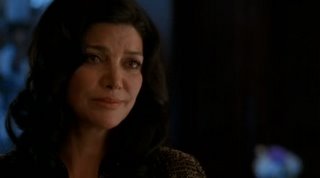 But what good caper show doesn't raise the stakes with the cops after them? This too could be the lynchpin to the entire series, telling us little by little more about Virginia Madsen's past, more about Amy Smart's showgirl day job and her power over others who rely on her (some for drugs, it seems), more about why that dude from "The Guardian" is a cold-blooded killer with a sniper rifle, and more about why Virginia Madsen's character and Shohreh Aghdashloo's character apparently don't get along.
But what good caper show doesn't raise the stakes with the cops after them? This too could be the lynchpin to the entire series, telling us little by little more about Virginia Madsen's past, more about Amy Smart's showgirl day job and her power over others who rely on her (some for drugs, it seems), more about why that dude from "The Guardian" is a cold-blooded killer with a sniper rifle, and more about why Virginia Madsen's character and Shohreh Aghdashloo's character apparently don't get along.
So, yes. This Tuesday. CBS. 10 pm. Go to it.
pondered by
is that so wrong?
at
1:33 PM
1 comments
![]()
Sunday, September 10, 2006
the novel that shocked the nation
Our entertainment media has gotten too tame lately. People seem offended too easily, or maybe it's just a few people who scream too loudly when they see something they don't like. There’s all this talk about values, and punishment for those who don’t hold them. Certainly on television things have been racier and edgier than ever before, and once they flirt with too racy or too edgy the FCC descends from somewhere and slaps fines based on rules that aren’t published anywhere. And then the taming happens.
The last great medium where there are no rules: the written word. One of the myriad reasons why I like it so much.
Heard of Peyton Place? Yes, it was a movie, and yes, it was a television show.... but first and foremost it was a novel, and it had everyone talking. It was a wildly successful blockbuster, but since its heyday it seems to have disappeared off the radar. The movie version came along a year after its publication, and was nominated for nine oscars, five of those for performances.
I’ve owned the book for years and tried reading it awhile back and put it down. I just picked it up again and blazed though it.... and you know what? I rather like it. It's kind of like a refreshing breath of air if you're searching for some quality shock value, the only problem is that you have to put yourself in a 1956 state of mind to appreciate it.
Peyton Place is probably floating around at the top of the list that inspired or borne the modern genre novel, but because its roots go back so far it kind of falls into the literary canon, I guess. Don't get me wrong, the quality of the writing is nothing special (I emphasize this.... at times it was downright bad) and would have loads of lit snobs putting the book down after the first page.... but this is not a book you read because of its command of language; you read it because it is a master juggler of multiple storylines, a trait that I think the novel has given up on.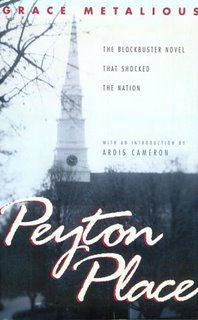 The book is all soap opera, and doesn't disappoint. Written by Grace Metalious, apparent young hotblood of the literary scene in the 1950s, we learn about the denizens of the New England hamlet of Peyton Place and all their dirty laundry. Metalious probably got her ideas from the tradition of radio serial and newfound television soap operas, and she pulls out all the stops. Want nudity? Check. Incest? You got it. Campy threats, murder, historical intrigue, and adolescent anguish? You've come to the right place.
The book is all soap opera, and doesn't disappoint. Written by Grace Metalious, apparent young hotblood of the literary scene in the 1950s, we learn about the denizens of the New England hamlet of Peyton Place and all their dirty laundry. Metalious probably got her ideas from the tradition of radio serial and newfound television soap operas, and she pulls out all the stops. Want nudity? Check. Incest? You got it. Campy threats, murder, historical intrigue, and adolescent anguish? You've come to the right place.
Because the book takes place in the 1940s, it's interesting to witness the mindset of characters and how they manipulated people that would never work (or at least not seem as threatening) today. One teenage girl gets herself pregnant by the son of the most powerful man in town, and thinks that she can leverage her pregnancy to be married and set for life.... so the town patriarch bribes her father to keep her mouth shut. She thinks she can tussle, and comes storming into the patriarch's office all pissed about the bribe. He doesn't bat an eye though, and threatens to have her taken to court: "Do you know how many witnesses it takes to testify against a girl and have her declared a prostitute in this state?" he asks her. "Only six." And he reminds her that he employs quite a bit more than six men.
Some other wacky stuff happens.... a grizzled housekeeper hangs herself in her employer's bedroom, a teenage girl has her arm snapped off by a defective carnival ride, and there are a handful of steamy sex scenes that probably got a few people blushing back in 1956. A girl who had been abused by her stepfather beats him to death with a hot poker from the fire. All in a sleepy New Hampshire town.
Metalious tells her story very calmly, and I think this is what I like most about it. She's not out to keep you interested in the arc of one character; she wants you to watch everybody and judge for yourself. At any one time we're learning about five, six, or seven different stories, and we see how they connect to one another and we know that not all of them do. The town is connective tissue enough. (Are you hearing this, TV studio executives? Why not look back to the model of what it means to be a serial program and find your roots back at the soap opera? I think a modern day Peyton Place on television would set a good example.)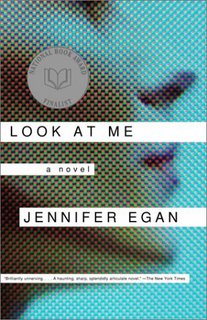
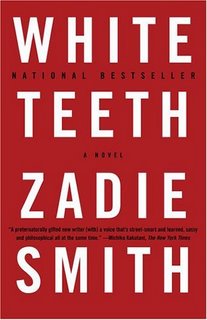 Novels don't traditionally try to pull off the multiple storyline feat.... but I'd be happy for someone to prove me wrong. Dual narratives seem to be a perennial favorite, though. Jennifer Egan's Look at Me walked away with a National Book Award nomination a few years ago, and the entire novel is like a tennis match between two completely separate storylines. Zadie Smith took on more than just two with White Teeth (which in its own right could be described as a post-post-modern British Peyton Place, and this is in every way a compliment), and despite torpedoing the last quarter of the book, it launched for her a very successful writing career. Both of these novels juggle their multiple storylines more or less in real time.... i.e. the action of the story moves forward as we learn about each story. Metalious does the same thing, but her stories seem to have been equalized somehow, and this, in part, makes them more interesting to me. Although I rather liked Look at Me and White Teeth, some of the stories that I had to read through were downright uninteresting in the face of the much poppier material they had earlier. Look at Me is about a supermodel who had her face destroyed in a horrific car accident.... so why do I spend half the novel learning about a teenage girl in the midwest falling in love with a terrorist? By keeping the tension high and the same emphasis (more or less) on the events of what happens in the town of Peyton Place, no matter how different they are, the novel of the same name remains equally interetsting throughout.
Novels don't traditionally try to pull off the multiple storyline feat.... but I'd be happy for someone to prove me wrong. Dual narratives seem to be a perennial favorite, though. Jennifer Egan's Look at Me walked away with a National Book Award nomination a few years ago, and the entire novel is like a tennis match between two completely separate storylines. Zadie Smith took on more than just two with White Teeth (which in its own right could be described as a post-post-modern British Peyton Place, and this is in every way a compliment), and despite torpedoing the last quarter of the book, it launched for her a very successful writing career. Both of these novels juggle their multiple storylines more or less in real time.... i.e. the action of the story moves forward as we learn about each story. Metalious does the same thing, but her stories seem to have been equalized somehow, and this, in part, makes them more interesting to me. Although I rather liked Look at Me and White Teeth, some of the stories that I had to read through were downright uninteresting in the face of the much poppier material they had earlier. Look at Me is about a supermodel who had her face destroyed in a horrific car accident.... so why do I spend half the novel learning about a teenage girl in the midwest falling in love with a terrorist? By keeping the tension high and the same emphasis (more or less) on the events of what happens in the town of Peyton Place, no matter how different they are, the novel of the same name remains equally interetsting throughout.
And, I have to say it, this is exactly what makes some serial television shows more watchable than others. Are you listening, TV executives?
pondered by
is that so wrong?
at
9:06 PM
1 comments
![]()
Friday, September 01, 2006
Vanished: better off vanishing from primetime
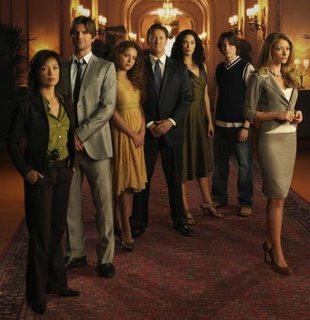 Knowing ahead of time that I will practically have no time to watch much new TV of the 2006-2007 season, I'm trying to do my best by getting a preview of new shows that exhibit some promise. Fox's latest offering "Vanished" is not one of these shows.
Knowing ahead of time that I will practically have no time to watch much new TV of the 2006-2007 season, I'm trying to do my best by getting a preview of new shows that exhibit some promise. Fox's latest offering "Vanished" is not one of these shows.
I only feel compelled to write about it because it misses the mark on so many levels, it's kind of maddening to think about why it was greenlighted. Basic premise: Senator's wife disappears, FBI gets involved, Senator's wife has shady dealings revealed (surprise, surprise), mystic symbols somehow relating to the disappearance start appearing in all the right places at all the right times.
Let's see how "Vanished" plays up to bat.
* Identity crisis: Is this a serial drama or an episodic drama? It seems to be a procedural that wants badly to be a serial. Each episode provides a high body count for a convenient FBI autopsy. Each episode gives us new FBI tricks to deepen the investigation (ATM camera with high-tech digital imaging quality, all within the hour; high-tech call center with instant-access organizational charts at the press of a button). Each episode features the Senator's teenage brood in some kind of trouble. But hold the phone.... we get random Celtic-like symbols at crime scenes! The senator has an ex-wife in town who's talked about a lot but apparently hasn't been casted yet! Keep tuning in viewer, questions will be answered! STRIKE ONE.
* Serial television tunnel vision. "Vanished" is all based around the disappearance of the Senator's wife. So, what happens when she's found? Show's over, plain and simple. No getting around that fact. They can't possibly drag this out for more than a season, two at its biggest stretch. Why are networks greenlighting serial shows that don't have a prayer for longevity? STRIKE TWO.
* Trashy smash cuts between scenes. Dear Fox: Computer generated cuts do not make good TV, they waste screentime. They're not good for "Prison Break", and they're not good for "Vanished". This is a kind of unfortunate afterbirth from "CSI", with its "let's follow the bullet as it entered the body!" sequences in flashback, giving us a gory pin-hole trajectory through a body coupled with gooshy sound effects. Maybe it worked for "CSI"'s first season way back when, but it's really old now. "Vanished" goes for variations on a theme, like computer-generated cuts as we follow the data as travels through the internet! We follow telephone calls as they travel through the wires! We also get white noise dissolves to commericals, as if we're looking through television static. Très artsy, now please stop. This is all a minor gripe, but still a gripe, and one that lessens the quality of the show. BALL ONE.
* (side note: Any show that relies on the audience to read emails sent to a character who is mentioned but never seen, or to read text messages between characters, is in dire danger. This violates the very tenets of screenwriting. Visual writing is paramount: what is seen must be written, and to maintain high energy there must be movement. Forcing the viewer to piece together overtly ominous plot points by watching some kid write e-mails to his offscreen may-or-may-not-be criminal mother is the opposite of energetic writing with movement.)
* Who's story is this anyway? The viewer is being asked to follow a couple of different storylines that don't gel together very well. Unfortunately, this makes their characters misguided, too. "Vanished" has three compartments: the FBI investigation into the disappearance, the Senator and his family issues, and the media coverage of the disappearance. Now, all good serial dramas balance multiple storylines with a large cast of characters that don't exactly always interact with each and every one another. "Vanished" goes to pains to try to keep each of these stories on the same track, all pointed in the direction of tracking down this missing wife.... thereby eliminating much room for growth. This seems to be a problem of a lot of serial television concepts, tying right back to the impossibility of multi-season longevity. This is something they're going to have to hammer out, and hammer out soon, so they get a pass, with strong suggestions to get in shape. BALL TWO.
* The cast. Some things look good on paper, such as Ming Na as a spunky FBI agent. Too bad she seems more content taking orders rather than carving out an interesting character for herself. Rebecca "The Noxema Girl" Gayheart plays a sexy/take-no-prisoners/predictably-smarmy television news reporter. Unfortunately she doesn't have the poise of an actual television news reporter and delivers each of her lines like an actor. At least she'll always have Urban Legend.... which she rocked in. The other characters are swimming through stereotype (the lead FBI agent guy plays the hardened officer committed to his cases, barking orders and slamming things around, but damn it he wants to get to the bottom of this! The senator character kind of bumbles around in shock over his goodie-goodie wife's apparently intricate past, just like we'd expect him to). Didn't the writers have a plan to write about anybody interesting? The characters are the key to the show, and if they suck, your show sucks. STRIKE THREE.
This show blows.
And bad news: "The Nine", forthcoming from ABC, isn't all that great either, and falls prey to the same serial television tunnel vision problem. But that's for another post.
pondered by
is that so wrong?
at
9:55 PM
6
comments
![]()
